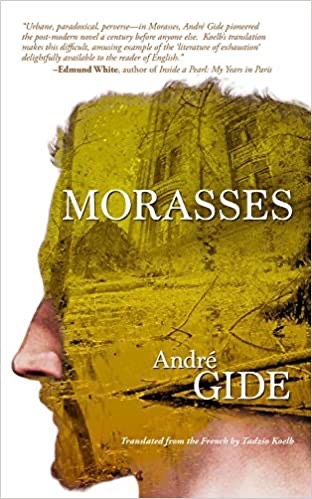CALYPSO EDITIONS
Morasses by André Gide
With an introduction by John Reed (excerpted):
The literary figures of the mid-twentieth century are simultaneously, paradoxically, cultural heroes and yokel blunderers, stalwart independents and villainous conformists; they are loudmouths about communism, the greatest political experiment since democracy, and they are sometimes perspicacious and sage, and they are sometimes petty and wicked. They are the Russian Revolution, and they are the CIA/British Secret Service Congress for Cultural Freedom, led by a vanguard of Arthur Koestler, George Orwell, and Bertrand Russell, with its fundamental mission to brainwash the entire world. They are Ezra Pound, and his radio pontifications for the Nazis. They are anti-semitism, they are knee-jerk atavism, they are racism and sexism, and they are every other nasty, trollish habituation of people-kind. But they are also courageous resistance, enormous personal loss, and a Western outlook that expanded, became more inclusive and humane—socially, sexually, racially and culturally. André Gideʼs early satirical work, Morasses, can be looked at as a historical curiosity, an allegory of literary Paris—of nineteenth century salons and a quaintly seductive, if frequently silly and petty, vision of the arts. ...
A leisurely stroll through the hall of mirrors of a writer’s mind (never was a book more aptly named), this deadpan comic fantasia on the creative life is not typical André Gide, but like a parody of the games he later played in The Counterfeiters. It’s a grandparent to My Struggle by Karl Ove Knaussgaard, only much funnier. —Christopher Bram
Discovering Gide’s Morasses is like finding that there’s one more chocolate left in the box when you thought they were all long gone. Tadzio Koelb’s note-perfect translation of this neglected miniature by the master ironist captures both the subtlety and freshness of Gide’s prose. Morasses is faux-fiction wrapped in a faux journal (by the greatest of 20th century diarists). This tale of swamps, ducks and pretentious poets defies genres and expectations. It is hilarious and it is delicious. It’s a gift not to be resisted, an indulgence I’d advise you to give in to today. —Robert Marshall
Tadzio Koelb has found a voice in English for Gide that artfully recreates the elegance of the prose in Morasses and also the humor. An assured and delightful translation. —Idra Novey
